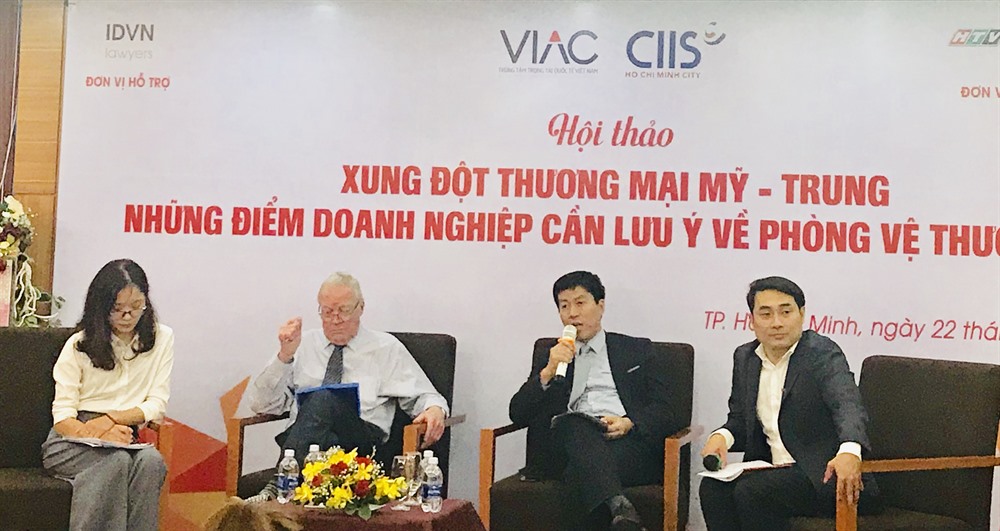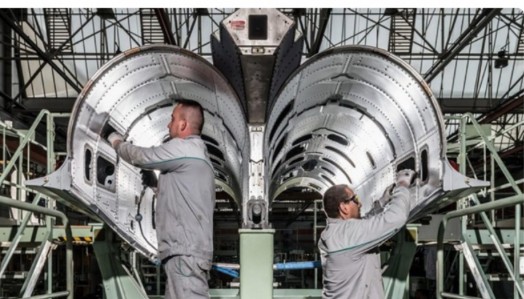Vietnamese companies urged to prepare for impacts of US-China trade spat

Speakers at a meeting on the US-China trade war held in HCM City last Friday. VNS Photo Bồ Xuân Hiệp
Speaking at a meeting last Friday, Chu Thắng Trung, deputy head of the Trade Remedies Authority of Việt Nam, said: “The trade war between the two largest economies has affected the flow of goods with the US increasing its trade safeguard investigations of major exporters, including Việt Nam.
“The trade war has caused the two countries to increase exports to third countries, creating pressure on other markets, including Việt Nam, and exacerbating the trend of trade protection and defence globally.”
Since the US is Việt Nam’s largest market and China is Việt Nam’s largest seller, it would surely be affected by the confrontation, according to Trung.
If they do not make peace soon, the risk of Vietnamese exporters being investigated by the US and facing trade defence measures is very high.
Vietnamese companies are forced to compete increasingly with foreign rivals but most have yet to understand the possible risks involved in the transformation process.
Experts said in the short term Việt Nam’s exports would not be impacted much because its goods subject to tariffs by both the US and China are limited, but in the long run it would be difficult to predict the impacts if the dispute continues to escalate and more tariffs are imposed.
Trung said the Trade Remedies Authority of Việt Nam was upgrading an early warning system which aims to help businesses predict which products could be exposed to trade lawsuits and monitor goods imported into Việt Nam which could damage domestic products.
Nguyễn Thị Phương Thảo, a lawyer at IDVN Law Office, said without strict regulations on the origin of imports and exports, China could send its products to Việt Nam to complete the final phases of production such as assembly, packaging and labelling.
This would help those goods avoid high tariffs but be a good reason for the US to investigate Vietnamese goods and apply trade defence measures, she said.
“The worry is that if the US concludes there is a transfer of goods from China into Việt Nam, all similar products from Việt Nam will be subject to the same tax rate as China.”
This is a new issue and is not covered by the WTO, meaning the US would unilaterally apply its laws, which would be detrimental to exporters, according to Thảo.
Vietnamese businesses should stay updated on trade remedial measures in importing markets, closely co-operate with government agencies and business groups and enhance their relationships with foreign partners, she suggested.
Châu Việt Bắc, deputy secretary general of the Việt Nam International Arbitration Centre (VIAC), said authorities should intensify trade remedies and companies should pay close attention to the market and promptly report unexpected developments to them.
Opportunities
Speaking on the sidelines of the seminar, William H. Barringer, an attorney at Morris, Manning & Martin, LLP, a law firm based in the US, told Việt Nam News that under most scenarios some countries would benefit and some would be disadvantaged if there is a chaotic trading system.
As one of the most competitive alternatives to China in many manufacturing sectors, Việt Nam could attract investments which otherwise would have gone to China, he said.
“Indigenous investments may also increase because of increased export opportunities at the expense of China.”
Because bilateral trade agreements would become increasingly popular, Việt Nam could attain a preferred position relative to other countries, particularly if a US-Việt Nam FTA is negotiated, he said.
Multilateral trade agreements could set the rules of trade, encouraging the US to join the TPP and allowing Việt Nam to be in the largest trade bloc in the world, he said.
While trade dynamics could change, Việt Nam is well positioned to take advantage of the changes, he said.
Risks
Barringer said multi-country supply chains and cross-border investment would become riskier and, therefore, less likely.
“A process of deglobalisation could well occur or the world could begin to be separated into trading blocks.”
Mini trade wars would be waged without any rules to constrain the parties and national security and trade issues could become increasingly intertwined as governments set policy, he added.
Experts said to minimise risks arising from trade disputes, Việt Nam should focus on expanding to more markets.
Recently a number of trade-defence lawsuits have been filed against Vietnamese iron, steel, fibres, household appliances, and tyres.
Last April the US announced a 25 per cent tariff on US$50 billion worth of Chinese goods. Then, more than 800 Chinese export items, worth about $34 billion, were subject to tariffs in July.
China instantly took countermeasures by imposing its own 25 per cent tariff on 545 categories of US products worth $34 billion.
The meeting was held by the HCM City International Integration Support Centre and the VIAC.
VNF ( VNS )
Recommended
 Economy
Economy



